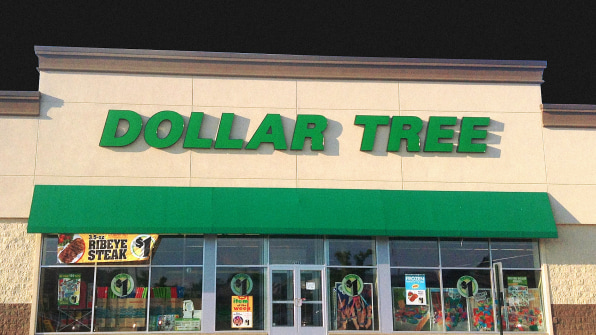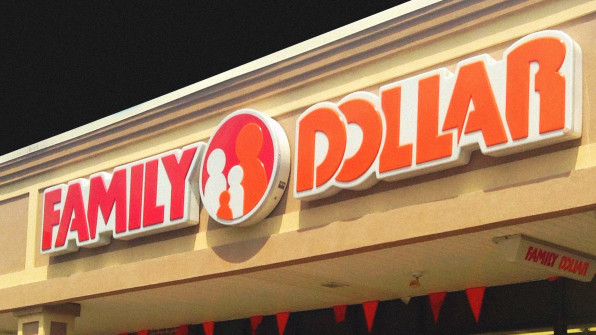Who Do People Harm Their Families? It Doesn't Make Any Sense
Up until 2015, Oasis, Kansas, a town of just over one,200 people, had one grocery shop: the Foodliner, a mom-and-popular shop owned past a local, Dough Nech. Around 225 locals a day would cycle through the shop, picking upwardly basics like bagged lettuce and chicken.
That changed when a Dollar General opened in Haven in February 2015. Almost immediately, Nech saw a drop in the flow of customers through Foodliner. Past last year, they rang up only around 125 people; sales dropped by xl%, he told The Guardian. This August, the Foodliner permanently closed.
Dollar Full general is the fastest-growing retailer in the U.S. and it, along with its competitors Dollar Tree and Family unit Dollar (which is owned by Dollar Tree), have made a killing in recent years past expanding into some of the canton's about vulnerable communities: small, rural towns, and urban, predominantly black neighborhoods. When that happens, dollar stores substantially take over the market, making it impossible for independent local retailers, like Foodliner, to thrive. And in doing and then, dollar stores essentially ensure that people living in the areas they target volition struggle to admission salubrious food. While affordable, dollar stores rarely offering whatsoever food beyond highly processed options, and in areas where it'southward already difficult to detect produce and fresh options (often called food deserts), they don't do much to change the status quo.
New research from the Institute for Local Cocky-Reliance, a nonprofit that supports local alternatives to entrenched economical systems, finds that since 2011, the number of dollar stores has grown from 20,000 to about xxx,000. They outnumber Walmarts and Starbucks, combined. They feed far more people than Whole Foods, the poster-child for healthy grocery stores. ILSR reports that Dollar General and Dollar Tree wait to expand to 50,000 stores in the next several years.

"Although dollar stores sometimes fill a need in places that lack basic retail services, at that place's growing evidence that these stores are not simply a byproduct of economical distress. They're a cause of it," write ILSR co-authors Marie Donahue and Stacey Mitchell. "In small towns and urban neighborhoods alike, dollar stores are leading full-service grocery stores to close. And their strategy of saturating communities with multiple outlets is making it impossible for new grocers and other local businesses to accept root and abound."
Mitchell and Donahue point particularly to Tulsa, Oklahoma, where more 50 dollar stores are concentrated in the urban center's black neighborhoods to the due north, and largely brim the whiter areas of the urban center. The north side of the city lacks a full-service grocery shop, and dollar stores take sprung upwards to fill in gaps left by long-continuing disinvestment in blackness neighborhoods, where larger supermarket chains are nonetheless hard to find. Just ILSR found that the proliferation of dollar stores are non helping the quality of life for residents–people in due north Tulsa have a 14-yr lower life expectancy than people in the rest of the city, and it's in part due to access to good for you options.
In both urban neighborhoods and rural areas, when dollar stores start opening, they spell economical trouble. Dollar Full general and Dollar Tree stores only utilise around eight people, and small independent groceries employ an average of xiv, according to federal data. David Procter, an expert on community evolution and director of the Rural Grocery Initiative at Kansas Land University, told ILSR that the effects of local stores disappearing are even broader. "The trouble is that if the grocery store closes, this impacts the town in a big way. Our inquiry shows grocers are barometers for other businesses in town: equally goes the grocery store, so goes other independent businesses in that community." Additionally, locally owned groceries have a better sense of community needs than big national chains, and would often offer commitment of fresh nutrient to seniors or people with mobility needs who couldn't hands admission stores. Dollar General and Dollar Tree practise non.

ILSR spoke with Vanessa Harper-Hall, a lifelong resident of Tulsa'southward north side, who ran for a Metropolis Council seat in 2016 on a platform of boosting admission to good for you nutrient and full-service groceries in the neighborhood. Once she took office, she began to push for a policy that would limit the expansion of dollar stores in north Tulsa, and instead grant priority for local, independent, and total-service groceries. Both the city'due south planning commission and the daily paper opposed it on the grounds that granting a let to a rapidly expanding concatenation is a surer bet than offering infinite to a new business.
But Harper-Hall stood past the idea, and helped residents launch a protestation campaign against a new Dollar Full general in the neighborhood while continuing to item the need for healthy food. In April 2018, Harper-Hall'due south ordinance passed, and became the start policy of its kind in the U.S.
North Tulsa volition soon welcome a new healthy store operated by Accolade Capital, a business organisation with an aim to bring fresh, healthy food to underserved areas. The small company operates around x stores in a scattering of states, and has funding from a community development financial establishment, which are specifically geared at supporting benign projects in low-income areas. Mesquite, Texas, a town besides struggling with food-access issues, reached out to Harper-Hall for advice and ultimately passed a similar ordinance to boring the dollar-store takeover.
Hall also points to initiatives like mobile produce trucks, which can deliver fresh food without the need for brick-and-mortar investment, as another tool to push button dorsum confronting dollar stores' dominance. And places like Mendocino County, California, have implemented stricter review processes that chain stores must go through in society to exist granted a permit.
Ultimately, though, one of the biggest barriers to local stores springing upwards to claiming dollar bondage is funding, ILSR writes. If cities and towns want to ensure that all residents take access to fresh, healthy, food, they demand to develop financing structures and partnerships with CDFIs and other nonprofit lenders and foundations to brand it economically viable for healthy stores and new local groceries to take root and provide for residents at costs that are competitive with dollar stores. Harper-Hall, having broken down the barrier for getting support for local groceries inked into city codes, says that politicians and leaders in other places shouldn't hesitate to utilize Tulsa's policy equally a model. "Having examples [of policies passed past other cities] keeps you as an elected official encouraged that this work is possible, even when you lot're upwards against opposition from the powers that be," she told ILSR.
Source: https://www.fastcompany.com/90278384/why-dollar-stores-are-bad-business-for-the-neighborhoods-they-open-in
0 Response to "Who Do People Harm Their Families? It Doesn't Make Any Sense"
Post a Comment